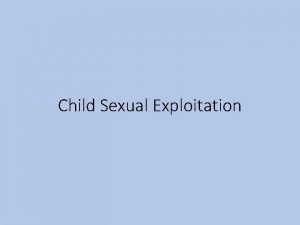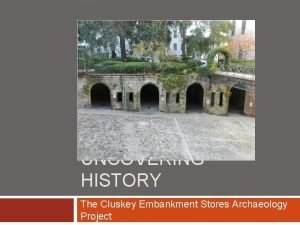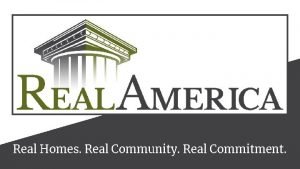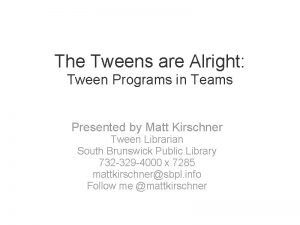Youre doing alright up there Uncovering the real

















- Slides: 17

“You’re doing alright up there”: Uncovering the “real” penal voluntary sector in Scotland Chris Mc. Cully, Development Coordinator, The Criminal Justice Voluntary Sector Forum

Introduction • Perception that: • • Voluntary sector in Scotland is in a good position Scotland adopting progressive approaches to justice “Privatisation” not really a thing Voluntary sector at the heart of government policy making • Reality: • • • Scotland has second highest rate of imprisonment in Europe (137 per 100, 000) Stubbornly high remand prison population (18% of roughly 7500 prisoners) Despite progressive legislation, big ticket items have made little impact (PAST - Tata) “No new money” Voluntary sector reporting considerable difficulties Uncertainty around flagship VS projects (e. g. PSPs)

Scotland (context) • Justice is a devolved matter (SG Justice Directorate and Community Justice Division) • Separate legal system from rest of UK • SNP minority government • No probation service: • Criminal Justice Social Work (CJSW) fulfil statutory obligations • CJSW based in local authorities • CJSW involved: (i) in the provision of services to the court; (ii) in the supervision of community sentences; (iii) in the delivery of prisoner throughcare and resettlement. • Social work ethos? Reducing imprisonment, public protection, rehabilitation and inclusion of offenders. Increasingly a reparative focus (including paying back by working at change!) Subject to National Standards. (Mc. Culloch and Mc. Neill, 2010) • Not without its problems – e. g. youth justice • A prison service that thinks it is a probation service (Throughcare) and building more prisons! • No Transforming Rehabilitation but Community Justice (Scotland) Act 2016 moves responsibility for CJ to LAs and local statutory partners (now 30 partnerships responsible)

The penal voluntary sector: Definition • Penal VS is “charitable and self-defined voluntary agencies working with prisoners, (ex)offenders, their families and their victims in prison, community and policy advocacy programmes. ” (Tomczak, 2017) • SG (go further? ) - “complex” behaviours that drive offending: Availability of suitable housing, Health, Education and training, Relationships with friends and family, Substance misuse, Financial difficulties, Attitudes to offending, Employment, Mental health • What about those on the fringes of that? E. g. faith networks, Bethany Christian Trust work. Prevention? Scotland post-Christie – rhetoric is that prevention should be the focus

PVS: Scale • We know at least 33 organisations (CJVSF Membership!) • Estimated that 30% of all services aimed at offenders are provided by the voluntary sector (Audit Scotland, 2012) • • Directory of Services (no more? ) Statutory and VS 1308 services identified 743 prison, 565 community • Skills for Justice suggest that around 22, 000 organisations in or around Justice spurious • 40, 000+ VS orgs in Scotland, 106, 000 paid staff, over 1, 000 volunteers • Working across multiple sectors, most do not have justice as their core focus (e. g. addictions, homelessness, mental health, child wellbeing) • What do they look like?

Types of Voluntary Sector Organisation in Scotland • Single issue, advocacy and campaign bodies – PRT, Howard League Scotland (lacking presence in Scotland) • Foundations and Trusts • Specialised service providers (contract funded) • Generic social service providers (contract funded) • Self funding charitable bodies • Arms length (ALEOs) • Non-specialist contract chasers • Social enterprises and social firms • Community enterprise groups • Consortia of any of the above • Public, private and non-profit initiatives • Public Social Partnerships • Private sector social responsibility groups

What does the PVS do? • Work both in prison and in communities (split? Considerable discussion on community vs. criminal with CJVSF) • Provide national and local services • Work with those committing offences at all stages of the system, their families, their victims and victims’ families • Specialist and general services (e. g. Sacro’s Fearless project vs. Cyrenians) • Works in partnership with statutory partners to provide services (e. g. Willow Centre, Circle’s North Lanarkshire Women’s Community Justice Service) • Public Social Partnerships: • HMP Low Moss PSP – voluntary sector involved in design and running of prison • National mentoring services – Shine and New Routes • Tayside Council on Alcohol • Prison Visitors’ Centres (and co-ordinator)

The elephant in the room (for literally every meeting ever): Funding • Funded, as suggested before, funded by a range of different sources: • • Contracts Discretionary funders Grants (SG and local) Fundraising (primarily for non-justice specific organisations) • Funding often for short periods of time – 1 year for SG (contrast Programme for Government) and contracts, 3 years standard from discretionary funders • High turnover of VS services – “priming the pump”, good evaluation, good feedback from service users, no funder willing to take it up, service gone • Vulnerable to changes in funding priorities (both from government and discretionary funders)

Into the realms of simulation: How does the VS interact with the state? “By community justice we mean: “the collection of individuals, agencies and services that work together to support, manage and supervise people who have committed offences, from the point of arrest, through prosecution, community disposal or custody and alternatives to these, until they are reintegrated into the community. Local communities and the third sector are a vital part of this process which aims to prevent and reduce further offending and the harm that it causes, to promote desistance, social inclusion, and citizenship… The third sector plays an important role in improving community justice outcomes. They are a source of innovation, responsiveness and flexibility, and can provide a meaningful connection to otherwise hard-to-reach service users and communities. The most effective way to improve outcomes for people and communities is by joined up working with the Third Sector at the planning stage… The third sector provide a broad range of interventions to support desistance and reintegration, for example, practical and emotional support for people who have offended and their families, specialised services focussed on drugs, alcohol, mental health problems and isolation, and genderspecific support services aimed at women involved in the criminal justice system. Third sector interventions can also improve the efficacy of services delivered by public sector agencies, by helping to develop strong relationships and working across silos to assist in the delivery of joined-up support. Community justice partners should: Capitalise on third sector interventions to improve community justice outcomes…” National Strategy for Community Justice, SG 2016

The Community Justice (Scotland) Act 2016 • Defined broadly (s 14) – those providing “services” or “representing or promoting interests” • Not included as statutory partner as unable to impose a duty upon “the third sector” (no legal duty to co-operate under s 35) • However – the work around is the duty to consult, nationally and locally. • Nationally, Community Justice Scotland must consult on corporate plans, strategies, and reports

Local Engagement in Community Justice Processes • Community Justice outcomes Improvement Plans (CJOIPs) are the main vehicle for CJ planning (s 19): • Assesses progress against outcomes • Identifies priority areas • Sets out action to be taken • In production of plan local partnerships must identify third sector and “make all reasonable efforts to secure the participation of such bodies in the preparation of the plan” (s 20) • Participation statement must be submitted with CJOIP (s 21) • Must consult when reporting on performance in relation to outcomes (“each third sector body involved in community justice in relation to the area”) (s 23)

The Scottish Prison Service Position on the Voluntary Sector “The SPS recognises that the Third Sector has a distinctive contribution to make across public policy challenges, and justice in particular, and that the Third Sector can often reach where the state and the market cannot. The SPS also recognises that the Third Sector has a well-developed understanding of service user needs twinned with a formidable track record of innovation around public policy challenges. The SPS recognises the Third Sector as a key partner in meeting the desistance challenge and we are committed to playing our part, alongside our partners in the Third Sector, to improve outcomes for people in the justice system in Scotland. The SPS recognises the campaigning role that the third sector plays in challenging social injustice and increasing the awareness of relevant issues. SPS is committed to working effectively with the Third Sector to maximise the impact of the limited resources available, to make sure that those services being funded and delivered meet the needs of the people in our care and to minimise duplication between services. If you have secured funding to deliver services in prisons then please follow the current ‘partnership agreement’ process described here. ”


Into the Real (or Hyperreal) • Scottish government: • • Genuine engagement nationally lacking VS being involved too late in legislation “Consultation” “No new money” – • £ 360 mil SPS budget • £ 33 mil community justice • Around £ 3 mil to dedicated VS services • SPS: • • • Engagement frequent but strategic Operational blocks – practitioners report difficulties gaining access, recalcitrant governors etc. Will not fund the VS (will only purchase) Building more prisons! (6) Throughcare – SPS staff professionalisation programme and expansion of Throughcare

• Locally: • 25 include some form of third sector representation in partnership • In 9 the sole representation was the local third sector interface, with many others including only one or two third sector partners • Only 13 had plans for how they would engage the broader sector • Actions involving the third sector were predominantly related to service provision • Little strategic inclusion • “Consultation” the default, few felt “empowered” or valued as full partners (Spectrum of Engagement) • Few are funding the VS locally (when they were before…)

Conclusion • Mismatch between rhetoric and reality • Voluntary sector subsidising local and national services? • How can a sector so dependent on government funding really challenge? • The hyperreal: not just facetious – what does VS rhetoric without real inclusion legitimise? • Are we subsidising not just financially but also by lending our authenticity?

CJVSF Contact Details Chris. Mccully@ccpscotland. org www. ccpscotland. org/cjvsf Find us on Twitter @CJVSF 0131 475 2676 Norton Park, 57 Albion Rd, Edinburgh, EH 7 5 QY. The Criminal Justice Voluntary Sector Forum (CJVSF) is hosted by CCPS (The Coalition of Care and support Providers in Scotland). CCPS is a company limited by guarantee registered in Scotland No. 279913, registered with the Office of the Scottish Charity Regulator as Charity No. SCO 29199.
 Good afternoon everybody
Good afternoon everybody Hope youre doing well
Hope youre doing well Kilimanjaro song lyrics jambo bwana
Kilimanjaro song lyrics jambo bwana He inspected us alright
He inspected us alright N=m/mm chemistry
N=m/mm chemistry Alright charlie cse resource
Alright charlie cse resource I'm alright severyn
I'm alright severyn By doing nothing we learn to be ill
By doing nothing we learn to be ill Anything worth doing is not necessarily worth doing well
Anything worth doing is not necessarily worth doing well Uncovering motives hots
Uncovering motives hots Uncovering the past answer key
Uncovering the past answer key Cluskey vaults
Cluskey vaults Youre goals
Youre goals What to do when youre angry
What to do when youre angry Being asexual
Being asexual Draw a diagram and add annotated labels
Draw a diagram and add annotated labels Jesus you're my firm foundation lyrics
Jesus you're my firm foundation lyrics Love and hate poem
Love and hate poem

































